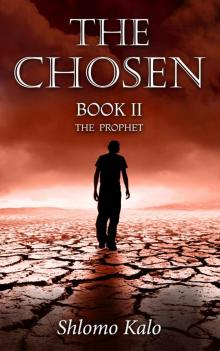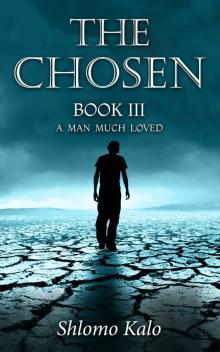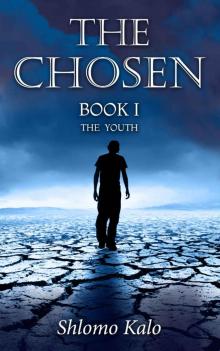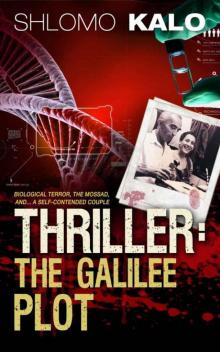- Home
- Shlomo Kalo
THE CHOSEN: A Man Much Loved: Historical Fiction (The Chosen Trilogy Book 3)
THE CHOSEN: A Man Much Loved: Historical Fiction (The Chosen Trilogy Book 3) Read online
THE CHOSEN
By
Shlomo Kalo
Book III: A MAN MUCH LOVED
© All Rights Reserved
Y D.A.T. Publications POBox 27019,
Jaffa 6127001, Israel
Email: [email protected] www.y-dat.co.il
More about and of Shlomo Kalo here: www.y-dat.com
THE CHOSEN SERIES
Original Hebrew title: HaNivchar (The three books in one volume)
4th Hebrew edition, 2011
3rd English print edition, 2014
First Kindle edition 2015
English translation by Philip Simpson
Cover design: Hagit Shani. Image: kwest/Shutterstock
ISBN: 978-965-7028-52-0
THE CHOSEN print editions are available in English, Hebrew and Korean
No part of this book, except for brief reviews,
may be reproduced or transmitted in any form
or by any means electronic, digital or mechanical,
including photocopying, recording or by any
storage or retrieval system, without permission in
writing from the Publisher
…In the previous parts of THE CHOSEN
Book 1: The Youth
“The Chosen” is a novel based on the Biblical story of Daniel, and Book One gives an account of his early years. The narrative opens with the aftermath of the conquest of Jerusalem by the armies of Nebuchadnezzar, King of the Chaldeans. A group of Jewish youths is to be sent to Babylon, to serve in the court of Nebuchadnezzar, and Daniel and his close friends, Mishael, Hananiah and Azariah, are among those selected. He has time for a final visit to the prophet Jeremiah, who gives him his blessing, and must then part from his mother and his younger siblings and join the convoy. (His father was killed in the last battle in the royal palace of Jerusalem, after the king had fled.)
The convoy proceeds on the long and tortuous journey from Jerusalem to Babylon, with various adventures along the way, blended with reminiscences of the past. Daniel has particularly fond memories of Nejeen, his sweetheart since childhood. During this journey he hears for the first time eyewitness accounts of his father’s death and also strikes up some unlikely friendships, which will prove significant, such as that with Or-Nego, a senior Chaldean officer and commander of the convoy. A few other Jewish youths, especially Adoniah, develop hostility towards Daniel.
On arrival in Babylon the four friends are given new names (Daniel becomes Belteshazzar; Mishael, Hananiah and Azariah are now -- respectively -- known as Meshach, Shadrach and Abed-nego) and must be educated for their roles in the service of the King, learning the Chaldean language and the ways of the court, and honing their equestrian skills. This section of “The Chosen” ends when the four friends finally come face to face with Nebuchadnezzar himself and must answer his questions. While pledging to serve the King, Daniel insists that his first loyalty is to his Judean heritage. The King -- cruel and capricious though he undoubtedly is -- respects the young man’s principles and promises him a responsible position in the imperial administration.
Book 2: THE PROPHET
Book Two finds the four young Jews -- Daniel, Mishael, Hananiah and Azariah -- firmly embedded in the court of Nebuchadnezzar, King of the Chaldeans, in Babylon. Daniel has risen to a position of eminence in the imperial administration and is regarded as a wise councillor. He uses his influence in a number of positive ways; thus he restrains the more belligerent generals and persuades therm not to mount a punitive raid against an impoverished province, and improves working conditions for the slave-labourers in the tanneries on the Euphrates. He gains additional royal favour when he proves himself adept at interpreting the King’s dreams.
When Nejeen arrives in Babylon the pair are reunited and their romance is rekindled. They marry -- in fact all the members of the quartet marry their sweethearts in a quadruple ceremony. On a number of occasions Daniel is approached by subversive elements among the exiled Jewish community, who are conspiring to overthrow Nebuchadnezzar. He refuses to support them, insisting that the prophecies of Jeremiah be upheld.
When the King builds a gold image and demands that all his subjects bow down to it, Mishael, Hananiah and Azariah (renamed -- respectively -- Meshach, Shadrach and Abed-nego) refuse to obey and are thrown into the furnace. They survive unscathed much to the surprise of the King, who is so impressed that he promotes the trio and announces that henceforward the Jewish religion is to be treated with the utmost respect. This section of the novel ends as the storm-clouds are gathering -- Zedekiah, King of Judah and vassal of Nebuchadnezzar, has rebelled, and a massive Chaldean offensive against Jerusalem is imminent.
Table of Contents
Book III: A MAN MUCH LOVED
As Deep As The Sea
Seraiah-Ben-Neriah-Ben-Mahseiah
The Siege
At Riblah
The Return Of The King
The Seven Seasons
Queen Temior
The Royal Couple
Belshazzar
The Death Of Nashdernach
The Feast
The Four Beasts
Abiriuch
The Pit Of Lions
Zedekiah
King Darius
The Wise, And The Teachers Of Righteousness
Book III: A MAN MUCH LOVED
As Deep As The Sea
King Nebuchadnezzar’s preparations, to leave Babylon and march on Judah at the head of his army, were completed to the last detail. Supplies were requisitioned, both for men and for beasts. Weapons were distributed and polished meticulously, uniforms keenly inspected, and anything apparently old or deficient was replaced with new, the same process being applied to armour, helmets and shields; wheels of vehicles were checked and their axles greased, wagons were reinforced, and battering-rams and siege-engines mounted on the carriages specifically designed for the purpose. Commanders were appointed and duties assigned, decrees issued. Every officer, senior or junior, studied the orders according to which he was to operate and learned them by heart, and all rehearsed their battlefield tactics and fighting skills, drilling and training under the watchful eyes of their immediate superiors until every soldier knew his place in the formation, knew who stood next to him, knew the operation in which he was to take part, what he was to do – and why.
Warhorses were groomed, pack-animals and fodder animals prepared for their long journey. Prayers were issued too for the soldiers to learn, to be said privately or in times of crisis, in small or large groups, and so the mighty Chaldean army became a single organism, bound by the ties of unity and harmony, of freedom and initiative, and exuding confidence.
Gradually, as the training continued and muscles were flexed, even the expressions on the soldiers’ faces changed, and the thinly disguised and habitual boredom, anxiety and suspicion – were replaced by looks of determination and self-assurance. Here and there, there were even smiles.
The Chaldean war-machine was built, assembled and lubricated with great precision, tried and tested and poised to strike – to punch a way through to its assigned objective, to trample down every obstacle in its path and inflict a crushing defeat on the enemy.
He watched all these preparations from a distance and felt a numb emptiness. He knew this was God’s will, and this knowledge went some way towards cancelling out the emptiness; despite his best efforts, the feeling was not obliterated, only checked.
He also knew that the Chaldean war-machine was about to be launched against his own people, causing injury to his family, the b
lood of his blood and flesh of his flesh, his acquaintances and friends from long ago, and the blow to be inflicted would be intolerable – more cruel than any ever suffered by this race, stubborn and accustomed to affliction as it was.
“Oh my Father in Heaven, my God, whose mercies are as deep as the sea, is it a sin to ask you yet again to pardon and forgive this people of yours, frustrate its enemy and avert the impending catastrophe, so it may be saved?”
And in the depths of his heart he heard that calm and clear voice, addressing him:
And how am I to save this people when it does not want me, and rejects the salvation that I offer? I, whose name is love, and freedom, and truth!
He fell on his knees, tears choking him and his shoulders shaking in a silent whimper that contorted his lips:
“Blessed are you, my Father in Heaven, my God, giving understanding to the ignorant and pretending to no one, bestowing your love upon those worthy of it and making mortals into immortals! Blessed! Blessed! Blessed!”
He fell prostrate on the ground, wiped away his tears and stood again, and taking the place of the emptiness in his heart, the living light shone there.
On the eve of his departure, Nebuchadnezzar summoned him to his presence, a summons that surprised him. It occurred to him that the King might be in some kind of a quandary, needing to give vent to his thoughts, and this supposition proved correct.
The King was waiting for him in one of the private rooms of the palace, not intended for receiving guests or for plenary council sessions but reserved for the King and his innermost circle.
For the first time since knowing the King he saw him in his domestic attire, without any royal pomp or trappings of authority. A blue robe emphasised his erect stance; King Nebuchadnezzar was a statuesque man, but not tall. He wore no head-covering and his raven-black hair, here and there flecked with silver, was combed back, reaching his shoulders, while his beard, though neatly trimmed, was almost waist-length.
The garb surprised him, but not in the way that might be expected. It struck him that even in this decidedly domestic clothing, Nebuchadnezzar remained Nebuchadnezzar, a king to his very finger-tips, before whom bowing and kowtowing were axiomatic, instinctive expressions of respect for one elevated, by his very nature, above the common herd, destined to rule and radiating majesty by sheer force of personality.
The room was neither long nor broad, being circular or more precisely – oval, without ornamentation or decoration or regal trappings, but the very presence of the King invested it with a glamour that could not be erased or ignored.
It was absolutely forbidden to sit in the presence of the King without his express permission, and he could not remember a single occasion when this privilege had been granted. Most audiences were conducted standing, while he, the King, sat on his throne, quite indifferent to the weariness or discomfort of his interlocutor.
This time, in an unusual departure from convention, the King himself was standing to receive him, and he remained standing throughout the conversation. Although there was no shortage of padded chairs and divans in the room, he did not resort to any of them; sometimes while speaking he would slowly pace the length of the room, a habit which he took to be a token of the King’s respect for him.
“God knows!” the King began – his voice resolute, metallic, the voice of one accustomed to issuing his decrees before the populace, a voice that would brook no interruption, a voice to stifle and silence the very thought of disagreement. There was no alternative but to heed this voice, and he knew that anyone whose heart was innocent of intrigue, whose spirit was pure, had nothing to fear from it; the very vehemence of the tone was such as to instil confidence and calm.
And the King went on to say:
“Oh, how I tried and tried again to avoid this situation, to avoid having to take this step! In my eyes, Judah has always been a lovely land, a land of unique qualities, the home of the Divine Presence, a land whose inhabitants have gained the favour of God, something denied other peoples.
“I respected the Jews, and the conquest of their land was never more than a strategic measure. I made no excessive demands of them, and they fared much better than most nations that have been defeated on the battlefield and occupied by foreign armies. I did no harm to the property of the Jews or the property of their king, or their places of worship, and wherever I breached the walls of Jerusalem, I ordered that they be rebuilt and restored. My only desire was to learn from the Jews! I wanted to know this God who is truth, enjoy the privilege of His revelation, the God who showed you the dream that I dreamed and then forgot – a task in which the Chaldean magicians and diviners, for all their world-wide renown, failed utterly. And the solution to the dream was also given to you by God, the God of truth! And this God Himself was revealed in all His glory to your three Jewish friends, the wondrous Meshach, Shadrach and Abed-Nego, saving them from the flames of the furnace!” The King walked slowly to one end of the room, and then retraced his steps and stood before him, going on to say:
“And in Judah of all places, the king whom I enthroned with my own hands, who persuaded me to appoint him king over his people and pledged allegiance to me in return, has risen against me and broken faith, and it is not me he is rebelling against but his God – it is Him he is defying and opposing!” Again Nebuchadnezzar walked slowly to that corner of the oval room where a table stood and on it, a black effigy of the god Bel, a cubit in height.
“And the angel of God, the prophet Jeremiah, warns the king repeatedly, and it is not of me that he warns him, but the perverted ways in which he has chosen to walk, refusing to obey his God, the God of the Jews. And this is beyond my understanding: I, Nebuchadnezzar, the pagan, the idol-worshipper – am more devoted to your God and believe in Him more fervently than your own king! The prophet Jeremiah, holy angel of God, prophesies of me and calls me God’s servant, while your king stops his ears and will not hear! I shall never understand it! And I tell you this!” – he moved closer to him, his eyes flashing sparks of fire: “This time it is all over! Zedekiah shall pay the full price of his treachery. He and his gang of cronies!
“Zedekiah consulted the Lord, the Lord who does not pretend, and He answered him, telling him that the Temple in Jerusalem is no longer a sacred site, for wicked men have defiled it, and Zedekiah at their head, and it is fit only to go up in flames, and I give you my word – I shall burn down the tainted sanctuary of the traitor Zedekiah!” There was no need for the King to raise his voice to express his rage, and he spoke without any change of tone.
The King, in his blue robe with the delicate gold embroidery at the collar, resumed his steady pacing, then stopped before him, studying his face keenly and evidently expecting a response.
And the response came, in a clear and tranquil voice that seemed to come from faraway:
“Why does King Nebuchadnezzar, who believes in God, the God of truth who created Heaven and Earth and all that is in them – still worship idols?” He nodded towards that black effigy of Bel.
Nebuchadnezzar was taken aback by the question, but not unduly offended. Indeed, he chuckled as he replied, with a sidelong glance at the image:
“If I were to discard Bel altogether, I would be deceiving myself, for I’m still committed to him. But the day will come when by the grace of the God that you serve I shall do whatever is the right thing! And my question to you is this: what will be the ultimate fate of your compatriots if you have kings like Jehoiakim, who tore up Jeremiah’s scroll in which the living words of God were inscribed and threw it in the fire, and persecuted Jeremiah cruelly, and Zedekiah, against whom I am taking the field tomorrow, who refuses to hear the word of the Lord as spoken by His prophet, and does not heed his warnings?”
And as an answer to the King’s question was explicitly required, he declared:
“Evil and bitter will be the fate of my compatriots! Affliction will pursue affliction, disaster will replace disaster, and destruction invite further destruction. Because my compa
triots have scorned their creator and defender and discarded Him, and have spurned Him and all the angels He has sent to them to warn them against the evil that they are bringing down upon their heads. But in the end, my unhappy people will repent of their misdeeds, and this through the grace and the mercy of the God who loves them. And the final outcome for this stubborn and quarrelsome race will be its return to God, and this return will bring about the salvation of all the peoples of the world, all nations and tongues and principalities!”
The King’s eyes were fixed upon him, their expression keen and bold like the look of a panther, and conveying admiration and joy – the joy of a king that is always held in check, and is thus all the more pure and sublime.
Nebuchadnezzar bowed low before him and said:
“Truly, your people is nothing other than the people of God!”
The King’s words did nothing to reassure or console him. Their effect was the opposite. In his heart a cloud of depression descended. As he was well aware, and as the King had confirmed, a people of God existed. Was it really his people? Would a people of God behave as his people had behaved, treat its God as his people had treated its God? What was the definition of a people of God, and who were its constituent members? And the answer sprang into his consciousness of its own accord and was inscribed there:
Those who know that His name is love.
And for His people… yes, for His people He is grieved. And His grief is deep. If only they would awaken from their blindness and their vain delusions and see what lies ahead. Prophets were sent to them, to warn them constantly against the ruin and destruction that are in store. And they do not listen, and they pay no heed, stubborn and arrogant as they are, trusting in their own strength. And bitter, oh how bitter will be their destiny!

 THE CHOSEN : The Prophet: Historical Fiction (The Chosen Trilogy Book 2)
THE CHOSEN : The Prophet: Historical Fiction (The Chosen Trilogy Book 2) THE CHOSEN: A Man Much Loved: Historical Fiction (The Chosen Trilogy Book 3)
THE CHOSEN: A Man Much Loved: Historical Fiction (The Chosen Trilogy Book 3) The Fantastical Adventures of Leutenlieb of the House of Munchausen
The Fantastical Adventures of Leutenlieb of the House of Munchausen THE CHOSEN : The Youth: Historical Fiction (The Chosen Trilogy Book 1)
THE CHOSEN : The Youth: Historical Fiction (The Chosen Trilogy Book 1) THRILLER: The Galilee Plot: (International Biological Terror, The Mossad, and... A Self-contended Couple)
THRILLER: The Galilee Plot: (International Biological Terror, The Mossad, and... A Self-contended Couple)